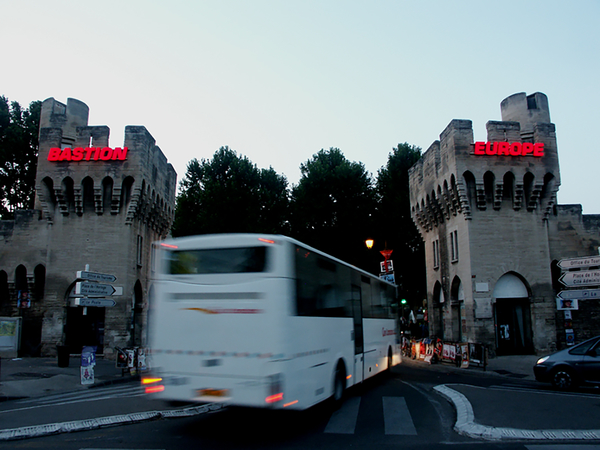Bastion Europe, 2004
Bastion Europe, 2004
2004
10 LED illuminated channel letter signs, dimensions variable
Site-specifically created for the 2004 Festival d'Avignon, Bastion Europe (2004) consists of 10 slogans protruding from various festival venues' frontiers. The installation, referencing the visual language of commercial advertising using illuminated channel letters in a bold typeface, is Rosefeldt's ironic questioning of Europe's status upon its vulnerable verge of fortified seclusion. Drawing from the US Defence Secretary Donald Rumsfeld’s controversial 2003 claim regarding 'Old Europe', the signs' slogans present themselves in a word play of either French, German or English. By altering between direct language, explicit statements and ambiguous questions, a game unfolds between the observer and the observed as the venues are transformed into sites of spectacle.
Reinforced during the Avignon Papacy, the city's walls antagonise visitors upon arrival with the words 'Bastion Europe' radiating from the main gate. The audacious title symbolically strengthens Avignon's fortresses and alludes to concerns surrounding the worldwide issue of immigration, Western privilege and exclusivity. Inside, 'Ça va durer longtemps' (It will last a long time) bears down in large illuminated channel letters from the Pope's palace: the most prominent building in Avignon. Ambiguous as to whether it's a question or a statement, Rosefeldt is addressing the lasting dominance of Christianity as the religious fundament of Western society. A variation of George W. Bush's quote from his anti-terrorism campaign following 9/11 – "Either you are with us or you are against us" – provokes passers-by whilst another sign asking 'Où est l'Est?' (Where is the East?) directs our attention towards a disappearing East following the fall of the wall. Rosefeldt's cautionary puns manifest confidently throughout the city as constant reminders of the pressure arising from globalisation and the consequential imbalance of wealth distribution and migration; one sign even directly announces, 'C'est juste le début' (It is just the beginning). Georg Büchner's famous 'Friede den Hütten! Krieg der Palästen!' ('Peace to the shacks! War on the palaces!') is inverted in one of the signs to read 'Krieg den Hütten, Friede den Palästen' (Peace to the palaces, war on the shacks), confirming the neoliberalist reality of contemporary economic marginalisation. Similarly, 'Société à responsabilité limitée' (Society of limited responsibility) reaffirms the current widening between the rich and the poor. Stemming from limited liability companies' abbreviations – SLR in French, or the equivalent GmbH (Gesellschaft mit beschränkter Haftung) in German – Rosefeldt playfully spells out the elitist ignorance in full as the sign sits amidst dining visitors.
Further parallels can be drawn between Europe's political split in the wake of the Iraq war, the festival's physical setting and the closed society created by the exclusive attendees. Thus, the notion of a bastion assumes a greater significance. Rosefeldt's public slogans reveal an uncertain future where an isolationist preservation of tradition risks exacerbating the pressing Western cultural hegemony.
E. Lapper
Exhibition
– Julian Rosefeldt: Asylum / Bastion Europe, Festival d'Avignon, July 2004 (curated by Thomas Ostermeier,
Vincent Baudriller & Hortense Archambault)












